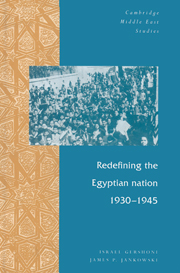Book contents
- Frontmatter
- Contents
- Illustrations
- Preface
- Acknowledgments
- List of abbreviations
- 1 The roots of supra-Egyptian nationalism in modern Egypt
- Part I The intellectual formulation and social dissemination of new supra-Egyptian orientations and ideologies
- Part II Supra-Egyptianism in Egyptian politics
- 7 Egypt, Arab alliance, and Islamic Caliphate, 1930–1939
- 8 Palestine, public opinion, and Egyptian policy, 1936–1939
- 9 The road to the Arab League, 1939–1945
- 10 Conclusion: from Egyptian territorial to supra-Egyptian nationalism
- Notes
- Select bibliography
- Index
8 - Palestine, public opinion, and Egyptian policy, 1936–1939
Published online by Cambridge University Press: 24 November 2009
- Frontmatter
- Contents
- Illustrations
- Preface
- Acknowledgments
- List of abbreviations
- 1 The roots of supra-Egyptian nationalism in modern Egypt
- Part I The intellectual formulation and social dissemination of new supra-Egyptian orientations and ideologies
- Part II Supra-Egyptianism in Egyptian politics
- 7 Egypt, Arab alliance, and Islamic Caliphate, 1930–1939
- 8 Palestine, public opinion, and Egyptian policy, 1936–1939
- 9 The road to the Arab League, 1939–1945
- 10 Conclusion: from Egyptian territorial to supra-Egyptian nationalism
- Notes
- Select bibliography
- Index
Summary
The Palestine Arab Revolt of 1936–9 was the crucial catalyst in reorienting Egyptian foreign policy toward active involvement in Arab politics. Yet the Palestine issue should not be regarded as the “cause” of the adoption of a more forward Egyptian regional policy. The basic reasons for the evolution of Egyptian nationalism in a supra-Egyptian direction lie in domestic Egyptian developments, particularly in the emergence of a larger educated public with a more Arab and Muslim outlook and values. The contribution of the Palestine issue was its role in transforming what had hitherto been a primarily cultural orientation on the part of this cohort into a political one. The growing identification of many Egyptians with the struggle of the Palestinian Arabs from the later 1930s onwards and their extension of moral support and material assistance to the Palestinians contributed decisively to the politicization of supra-Egyptianism. The Palestine issue became the mobilizing force impelling both Egyptian public opinion and Egyptian governments into involvement in regional politics.
What allowed the Palestine question to play such a central role in Egyptian politics? Several aspects of the conflict in Palestine made it of particular significance to Egyptians. First, it was primarily an anti-imperialist revolt, and indeed was directed against the same imperial power (Great Britain) which had for so long dominated Egypt. Thus it possessed a powerful emotional resonance for many Egyptians.
- Type
- Chapter
- Information
- Redefining the Egyptian Nation, 1930–1945 , pp. 167 - 191Publisher: Cambridge University PressPrint publication year: 1995
- 1
- Cited by



